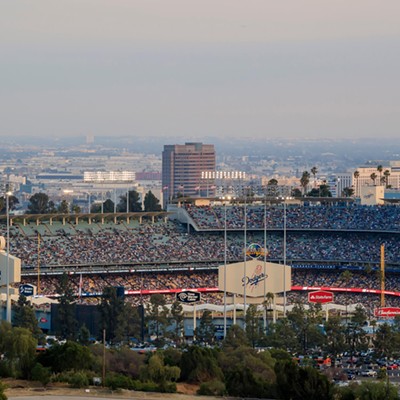Jan. 21 was a great day for Cleo Robinson, as it was for a lot of African-Americans. (It probably should have been a great day for all Americans, but we're not quite there yet.) After all, a black president—having been re-elected by a majority of American voters—was being inaugurated on Martin Luther King Day. That's pretty special.
Instead of kicking back and enjoying the day, Cleo spent his time refereeing a high school basketball game at McKale Center as part of the MLK Classic. He (and all of the other refs who worked the seven games that day) donated their checks so that tournament organizers could award $500 scholarships to a couple of high school seniors.
Cleo was attending Northern Arizona University on an athletic scholarship the day that Martin Luther King Jr. was assassinated (April 4, 1968) and, like most people who lived through the 1960s, that day is a touchstone in his life.
"I remember it really well. There was a young woman, and I don't know how, but she always seemed to know everything first and then went around telling everybody. I remember when she told me that it had happened that I wasn't all that surprised. We all thought sure that the Klan was involved."
Cleo was born and raised in Rillito, a small, almost all-black enclave near the Portland Cement plant that serves to signal one's departure from the Tucson metropolitan area on the way to Phoenix. Rillito was founded by people who had come here from Texas and other parts of the South during the Depression/Dust Bowl, looking for work in the cotton fields in and around Marana.
He attended Marana High School, which, back in the 1960s, served four distinct groups of kids. There were the farmers' kids from around Marana, the cotton pickers' kids from Rillito, the miners' kids from the Silverbell area, and then the handful of kids from northwest Tucson (the Marana School District actually extends down to the northwest corner of Ina and Thornydale).
There wasn't any overt racism at Marana High, but Cleo recalls that the different groups pretty much kept to themselves. "We had a couple Mexican guys who hung out with us, but that's because they were also athletes."
No matter how good the Rillito athletes were, about all they had to look forward to after leaving high school was, according to Cleo, "either picking cotton or chopping cotton." (The latter involves using a hoe to remove weeds from around the cotton plants.) But then, that all changed.
His eyes light up when he talks about his brother, Paul, a couple of years his senior. Paul was one of the first stud athletes to come out of Rillito, a multi-sport monster who starred in football and track. After high school, he ran track at Eastern Arizona College. (Pima Community College didn't exist at the time; it opened in 1969.)
After his time at Eastern was up, Paul Robinson faced a tough choice. By then he was married, with a child on the way. He felt that it would be best to stop his education and get a job to support his family. But Paul Robinson had been the first Rillito kid to actually go to college and he felt that he had an obligation beyond his personal situation.
"Paul knew that all of us were looking up to him," Cleo recalls. "He felt that stopping college after two years would be a sign of failure and he didn't want to let any of us (in Rillito) down."
Paul's parents and his in-laws cobbled together some money to help keep the young couple afloat and he moved on with his education. He initially was set to go to NAU, but at the last minute, ended up at the University of Arizona. As the story goes, when the NAU coach learned that Paul wasn't coming, he called Paul and said, "Send your brother (Cleo) instead."
Paul was a second-string running back for the Wildcats until one fateful day. The Cats were playing at Ohio State and an injury to the starter put Robinson in the game. He ran wild against the heavily favored Buckeyes, rushing for more than 120 yards in the 14-7 upset victory. The Cats would win only two other games all year, against the fledgling Air Force Academy and then-rival New Mexico.
In the Ohio State crowd that day was legendary NFL coach and owner Paul Brown. His new team, the Cincinnati Bengals, drafted the Wildcat running back and Robinson responded by becoming only the second rookie ever to rush for more than 1,000 yards in a season. Paul Robinson was named the American Football League's Rookie of the Year by The Sporting News.
Both Cleo and younger brother Jerry would follow Paul to college and all three earned degrees.
For quite a long time, Cleo was one of the Pac-10's top football officials, but he has since moved up into the instant replay booth. ("Same pay, plus air conditioning," he jokes.) And, at 66, he is still one of the best high school basketball refs around. After he finished the game at McKale, he got set to go home and maybe watch some of the inauguration festivities.
As Ice Cube once said (before he started making sappy family movies), I guess it was a good day.







